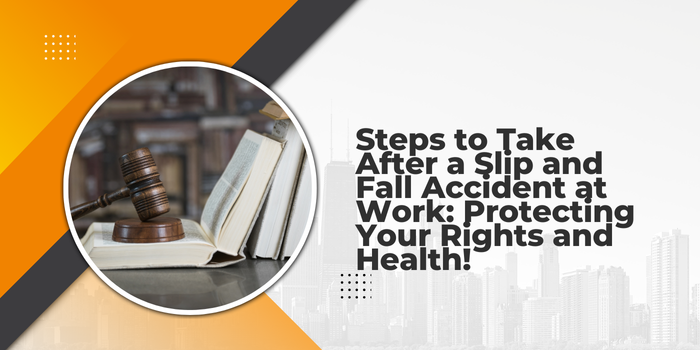Slip and fall accidents can happen unexpectedly, especially in the workplace, where hazards such as wet floors, uneven surfaces, or debris can pose a risk to employees. If you’ve been injured in a slip and fall accident at work, it’s essential to take immediate action to protect your health and rights. In this comprehensive guide, we’ll outline the steps you should take after a slip and fall accident at work to ensure you receive proper medical attention, report the incident to your employer, and navigate the process of seeking compensation for your injuries.
Seek Medical Attention:
The first priority after a slip and fall accident is your health and safety. If you’ve been injured, seek medical attention promptly, even if your injuries seem minor. Some injuries, such as concussions or internal trauma, may not be immediately apparent but can have serious consequences if left untreated. Follow your doctor’s instructions for treatment and document all medical expenses and diagnoses related to your injury.
Report the Accident to Your Employer:
Inform your employer or supervisor about the slip and fall accident as soon as possible. Follow your company’s established procedures for reporting workplace injuries, which may involve completing an incident report or filling out a workers’ compensation claim form. Provide detailed information about the circumstances of the accident, including the date, time, location, and any contributing factors such as slippery floors or inadequate lighting.
Document the Scene:
If you’re able to do so safely, gather evidence at the scene of the accident to document what happened. Take photographs or videos of the hazardous conditions that caused your fall, such as spilled liquids, uneven flooring, or broken handrails. Collect contact information from any witnesses who may have observed the accident and can provide testimony about what they saw.
Preserve Evidence:
Preserve any physical evidence related to the slip and fall accident, such as torn clothing, damaged equipment, or footwear worn at the time of the incident. Keep copies of medical records, doctor’s notes, and any correspondence with your employer or insurance company regarding the accident. These documents will be crucial in supporting your claim for compensation.
File a Workers’ Compensation Claim:
In most cases, employees injured in slip and fall accidents at work are entitled to workers’ compensation benefits. File a workers’ compensation claim with your employer’s insurance carrier to seek coverage for medical expenses, lost wages, and rehabilitation costs resulting from your injury. Follow the procedures outlined by your state’s workers’ compensation system and provide all necessary documentation to support your claim.
Consult with an Attorney:
If you encounter difficulties obtaining workers’ compensation benefits or believe that negligence on the part of your employer or a third party contributed to your slip and fall accident, consider consulting with a personal injury attorney who specializes in workplace accidents. An experienced attorney can assess the circumstances of your case, advise you on your legal rights, and represent your interests in negotiations or litigation.
Follow Up on Medical Treatment:
Attend all scheduled medical appointments and follow your doctor’s treatment plan for your injuries. Keep detailed records of your medical treatment, including prescriptions, physical therapy sessions, and any recommended follow-up care. Document the impact of your injuries on your daily life, including limitations on mobility, pain levels, and activities you’re unable to perform due to your condition.
Cooperate with Insurance Investigations:
If your workers’ compensation claim is under review or investigation by the insurance company, cooperate fully with any requests for information or documentation. Provide truthful and accurate statements about the circumstances of the accident and your injuries, but be cautious about providing information that could be used against you to deny or minimize your claim.
Know Your Rights:
Educate yourself about your rights as an injured worker and understand the protections afforded to you under workers’ compensation laws. Familiarize yourself with the deadlines for filing claims, the types of benefits available to you, and the process for appealing denials or disputes. Don’t hesitate to ask questions or seek clarification from your employer, insurance company, or legal representative if you’re unsure about your rights or entitlements.
Focus on Recovery:
Finally, prioritize your recovery and well-being as you navigate the aftermath of a slip and fall accident at work. Follow your doctor’s recommendations for rehabilitation, rest, and self-care to facilitate healing and minimize the long-term impact of your injuries. Seek support from friends, family, or mental health professionals if you’re experiencing emotional distress or anxiety related to the accident.
Conclusion:
Experiencing a slip and fall accident at work can be a traumatic and overwhelming experience, but taking proactive steps to protect your health and rights can help you navigate the aftermath with confidence and resilience. By seeking medical attention promptly, reporting the accident to your employer, filing a workers’ compensation claim, and documenting the scene and your injuries, you can lay the groundwork for a successful recovery and resolution of your claim. Remember that you’re entitled to compensation for your injuries and losses, and don’t hesitate to seek legal guidance if you encounter obstacles in obtaining the benefits you deserve. With patience, perseverance, and the right support system in place, you can overcome the challenges posed by a slip and fall accident and move forward toward a brighter future.



